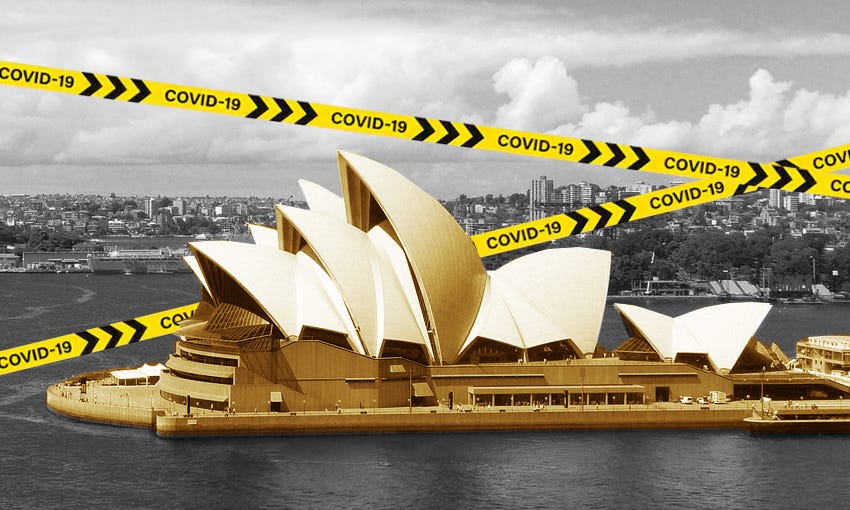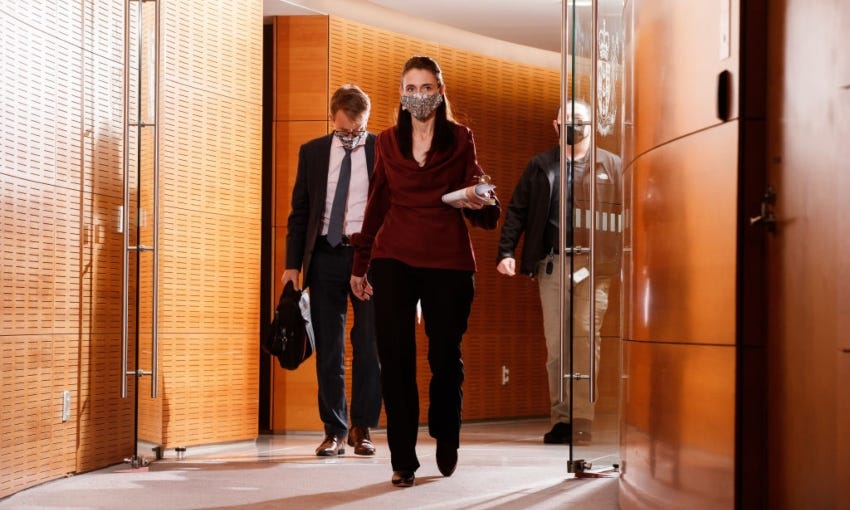Australia abandons the elimination strategy
The country's prime minister says eliminating Covid-19 no longer makes sense and points to New Zealand as an example of the strategy's failure.
Good morning and welcome to The Bulletin for Wednesday, August 25, by Justin Giovannetti. Presented in partnership with Z Energy
In today’s edition: The end of elimination in Australia as the PM tells state premiers to open up, an update on New Zealand’s outbreak and Sir Tim’s email saga.
The elimination strategy is finished across the Tasman. There are over 11,000 active cases of Covid-19 in New South Wales and a large part of the Australian population is under lockdown, but prime minister Scott Morrison has said the days of elimination are over. He pointed yesterday to New Zealand’s return to level four as a sign that the strategy can’t work, 9 News reported. “We can't stay in the cave,” said Morrison, referencing the 2013 children’s movie The Croods. The prime minister wants states to reopen once vaccination levels are high enough, while some premiers are still aiming to get rid of the virus first.
What’s Australia’s new plan? Before the Sydney outbreak, Australia’s leaders had agreed on a roadmap out of the pandemic that coupled suppressing the virus with vaccination targets, according to The Guardian. There’s now a concern among premiers that the country has changed direction after Morrison used new modelling from the Doherty Institute to justify a call for relaxing restrictions. The institute predicted that with 70% vaccine coverage of adults, the country could face 385,000 cases and 1457 deaths over six months. However, under “optimal public health measures” with rapid testing, tracing and isolating of cases, the tally would be reduced to 2737 infections and 13 deaths
The effective end of the trans-Tasman bubble. On Monday, prime minister Jacinda Ardern said quarantine-free travel would not resume while the virus was circulating in Australia. Morrison’s call to reopen and his view that New Zealand is now the poster child of pandemic response failure indicates that the bubble won’t be coming back anytime soon, if ever. New Zealanders stuck across the Tasman will need to queue up for a spot at managed isolation to get home. Unfortunately, new bookings are now paused for border facilities and as Stuff reports, someone managing a government Twitter feed thought that closing off MIQ was the perfect time to make a joke.
The state of Australia’s lockdown. Some readers have pointed out in recent days that the greater Sydney area’s lockdown and New Zealand’s level four lockdown are very different animals and should not be compared. According to Stuff, the New South Wales situation is closer to a New Zealand level three. For starters, restrictions are only tougher in certain neighbourhoods, very technically called local government areas. In those LGAs where the virus is circulating, outdoor exercise is limited to one hour a day and there's a curfew from 9pm to 5am, according to ABC. In other areas of the city, people can go to work if they’re unable to work from home, restaurants and cafes are open for takeaway, and garden centres and timber yards remain open for tradies.
What comes next for New Zealand’s closest neighbour? Looking from afar it's a confusing situation. The premier of NSW has said she’ll begin to relax restrictions from next month, while News.com.au reports the state’s chief medical officer is warning that mask use might be around for years and divine intervention (“God help us”) may be necessary to beat off another variant. State premiers are trading barbs with each other, along with the prime minister. The Sydney Morning Herald sums up the situation with a look at what it means to “live with the virus.” In short: a quarter of the country is vaccinated and relatively safe while the other three quarters might as well be living in the 17th century.
The Spinoff is doing our utmost to keep you updated on Covid-19 related news through this outbreak. Every dollar our members contribute directly funds our editorial team and is devoted to ensuring we do more. Click here to learn how you can support the team today.
The Māngere church is now this outbreak’s largest infection site. As of yesterday, 58 cases had been linked to the Assemblies of God Church of Samoa, making it the largest sub-cluster in an outbreak that now has nearly 150 infections. About half of the infections detected so far are in people of Samoan heritage, Stuff reports. According to Ashley Bloomfield, the Samoan and wider Pacific community has turned out for testing in a significant way. It's a key contribution to the national effort to end this outbreak quickly.
Yesterday was another big day in lockdown, with the government confirming the youngest case is an infant, and the opposition asking questions in two select committee meetings. The Spinoff’s live updates covered it all.
Many of New Zealand's cases weren't vaccinated because they aren't eligible. While there have been a number of breakthrough infections detected so far, that’s when a vaccinated person tests positive, most cases never got a shot for a shot. Craig McCulloch from RNZ has concluded the government needs to do a better job of explaining the sluggish vaccine rollout. As he writes, the prime minister has so far “been unapologetic and dismissive of any criticism of the government's vaccination campaign.”
This is not a good time for a power company to show windfall profits. The country's biggest electricity consumers have crunched the numbers and now claim Meridian Energy earned $3.5 billion in excess profits over the past two decades, according to BusinessDesk (paywalled). Nearly half was in the past five years. The company dismisses the claim, but the entire electricity market is now under scrutiny after a well-publicised blackout earlier this month. After the government launched market surveys of petrol vendors and supermarkets for high profits, attention could soon turn fully to the power sector. On the other hand, the government owns just over half of Meridian and would have pocketed quite a bit of that profit.
The saga of Tim Shadbolt's emails has taken another odd turn. Invercargill council is undertaking a $10,000 independent review of its electronic policies after an incident where it seemed councillors were reading the mayor's emails. However, the Otago Daily Times reports that Sir Tim was the only person on council to vote against the review because he doesn't trust it. An increasingly wide gap is growing between the mayor and the rest of council, many of whom question his basic ability to do his job.
Got some feedback about The Bulletin, or anything in the news?
Get in touch with me at thebulletin@thespinoff.co.nz
Jacinda Ardern and Ashley Bloomfield on Monday. (Robert Kitchin/Getty Images)
Right now on The Spinoff: Toby Manhire finds seven out of 10 New Zealanders still back the elimination strategy, according to an exclusive poll. Justin Latif reports that the south Auckland church at the middle of the outbreak now faces racist, and very factually incorrect, abuse. Liam Rātana (partner content) writes about a camp to help young Māori and Pacific students become scientists. The brains of The Spinoff have made a list of the best podcasts for your sanity-mandated walks around the neighbourhood. Sleep week is going into overtime and Don Rowe has a guide to lucid dreaming and how to get more of it, because lucid dreaming is great.
For a feature today, the end of the American empire. Textbooks could one day show a photo of a military helicopter evacuating the US embassy in Kabul as the moment when the American empire ended. It’s a cliché, but it’ll need an illustration eventually. The end of US dominance might have been a long time coming, but the collapse of Afghanistan’s government feels like a tectonic moment for the US and the broader west. The end isn’t here yet and history is still being written every day, but the humiliation is clear. There will be threats and meetings and firefights and hair-raising evacuation stories for weeks to come. Writing in The Economist (soft paywall), Niall Ferguson looks ahead to the post-American world and finds it won’t be a peaceful:
The problem, as this month’s debacle in Afghanistan perfectly illustrates, is that the retreat from global dominance is rarely a peaceful process. However you phrase it, announcing you are giving up on your longest war is an admission of defeat, and not only in the eyes of the Taliban. China, which shares a short stretch of its vast land border with Afghanistan, is also closely watching. So is Russia, with zloradstvo—Russian for Schadenfreude. It was no mere coincidence that Russia intervened militarily in both Ukraine and Syria just months after Obama’s renunciation of global policing.
Team NZ skipped the Paralympic opening ceremony. At least a dozen Covid-19 cases were detected in paralympians before the games opened last night. Team New Zealand took a pass on the opening ceremony to reduce the risk of infection, Stuff reports. The games take place under a state of emergency in Tokyo, where over 4,000 cases were detected on Sunday. Just like the Olympics, there will be no spectators. The flag of the now defunct Afghan government flew at the ceremony, despite the country’s athletes not being able to leave their country.
That's it for The Bulletin. If you want to support the work we do at The Spinoff, please check out our membership programme.







